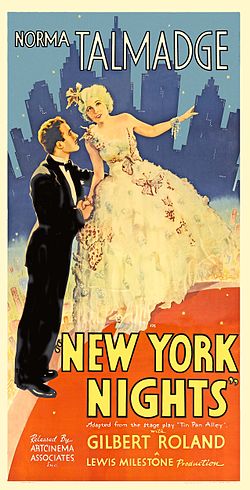| New York Nights | |
|---|---|
 Theatrical poster | |
| Directed by | Lewis Milestone |
| Screenplay by | Jules Furthman |
| Based on | Tin Pan Alley 1928 play by Hugh Stanislaus Stange |
| Produced by | Joseph M. Schenck John W. Considine Jr. Norma Talmadge |
| Starring | Norma Talmadge |
| Cinematography | Ray June |
| Edited by | Hal C. Kern |
| Distributed by | United Artists |
Release date |
|
Running time | 81 minutes [1] |
| Country | United States |
| Language | English |
New York Nights is a 1929 American pre-Code crime film, directed by Lewis Milestone, and based on the 1928 play Tin Pan Alley by Hugh Stanislaus Stange. [2] The film is known for being leading actress Norma Talmadge's first sound film.
Contents
As per U.S. copyright law, the film entered the public domain on January 1, 2025.